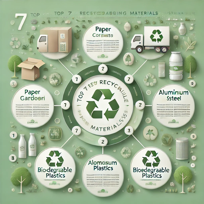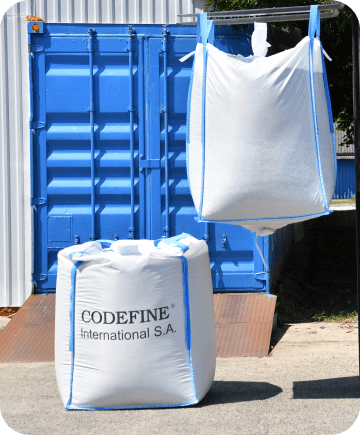Home » Posts Page » Blog » Sustainability and Environmental Impact » Top 7 Recyclable Packaging Materials for Sustainable Businesses

Are you keen to present as an eco-conscious business that takes things like carbon emissions seriously? Switching to recyclable packaging is one of the easiest ways to do this. As well as lessening your dependency on materials like single-use plastic, using recyclable materials boosts your credibility as a business, helping you secure new customers and maintain relationships with current ones.
When choosing recyclable packaging solutions for your business, you’ll want to consider things like biodegradability. Compostable materials are incredibly easy to dispose of, eliminating the need for third parties to get involved with recycling. You’ll also want to think about reuse. Many types of packaging can be repurposed many times before they even need to enter the recycling chain.
Cost is another thing to bear in mind. If using a certain type of material is going to be cost-prohibitive, explore cheaper alternatives. Furthermore, determine how easy it is for packaging material to be recycled. Cardboard and paper are widely recycled with few exceptions, while recycling low-density polyethylene can prove more difficult.
Ready to curb your carbon footprint? Rethinking the packaging materials you’re using is a good first step. Below are some of the most common types of recyclable packaging material you’re likely to encounter.
Polypropylene (PP) is a highly desirable material. It’s strong, lightweight, and can be used to make premium packaging that’s both long-lasting and reusable. PP bags are used across many different industries, with near-endless applications.
While PP bags are built to last, many of them can eventually be recycled once they’re no longer fit for purpose. This recycled material can then be used to produce a wide range of plastic products, including more packaging. It’s not uncommon to find PP bags made from as much as 70% recycled polypropylene.
Flexible intermediate bulk containers (FIBCs) are frequently manufactured from polypropylene. Known for its high tensile strength and durability, this wonder material is a popular choice for packaging and can yield significant cost savings. What’s more, it’s also recyclable. Depending on the application, PP bulk bags can be reused several times.
However, there are some limits to PP as a recyclable material. If used in food processing and manufacturing, bulk bags must be made from 100% virgin material. That being said, various sectors use FIBCs made from recycled polypropylene, making them a reliable and environmentally friendly option.
Jute bags are commonly used to store and transport loose food items and agricultural products. Durable and breathable, they’re a robust choice for those looking for a cost-effective packaging solution. Furthermore, jute bags are made from wholly natural materials.
Jute is easy to produce with a minimal carbon footprint, while the material is also readily recyclable. The natural jute fibers can be recycled many times, with repurposed material used to make all manner of products. As well as being recyclable, jute is also fully biodegradable.
Even if the containers you’re using can’t be recycled, the material used to line them can be. Container liners are a versatile type of packaging that allows containers to be used many times, without the worry of cross-contamination and damage to stored contents. They can also make loading and discharging more efficient.
Depending on what they’re made from, container liners can also be recyclable. They’re typically manufactured from polypropylene, polyethylene, or a combination of both. In many scenarios, both types of material can be recycled, making container liners an environmentally friendly addition to your operation.
Low-density polyethylene (LDPE) and high-density polyethylene (HDPE) are a commonly used packaging material. They’re used to create rigid containers like bottles and boxes, as well as more flexible packaging like bags and plastic films.
The good news is that both types of polyethylene are also recyclable, making them a smart choice if you’re looking to go green. While rigid polyurethane is fairly easy to recycle, things do become more complicated when it comes to recycling softer, more flexible packaging. Nonetheless, this lightweight and versatile material is a good idea if you’re eager to embrace greener alternatives to packaging.
Paperboard and kraft paper are some of the most frequently used types of packaging. They’re also often used as a type of secondary packaging. The raw materials of both can be recycled many times, making it one of the most carbon-neutral packaging solutions on the market.
Paper is widely recycled with few limits in place with local authorities, making it straightforward for consumers to recycle material themselves. Additionally, paper and cardboard are compostable, making it easy to dispose of both materials without causing harm to the environment.
Reusable tote bags are a regular sight over the shoulders of shoppers. Often used for trips to the grocery store, they’re a greener alternative to plastic bags and other types of packaging. Consumer appetite for this type of packaging has soared in recent years, helping stamp out plastic waste significantly.
Many totes can also be recycled, with most made from organic materials like cotton. While they’re designed to be reused many times, many of the key elements that make up a tote can be recycled once they reach the end of their operational life.
First determine where you can actually incorporate recyclable packaging materials, as there are some restrictions in place depending on industry and application. Once you’ve done that and started using recyclable materials, make sure you have processes in place to actually fulfill your recycling commitments.
Ready to introduce more sustainable bulk packaging to your operation? Codefine can help. For more than 70 years, we’ve been offering customers an extensive range of eco-friendly packaging solutions that combine innovation with affordability.
Ready to make the swap to more planet-friendly recyclable packaging materials? Explore the full range online today. Alternatively, get in touch with the team to discuss your packaging requirements in more detail.
